| Listing 1 - 10 of 218 | << page >> |
Sort by
|
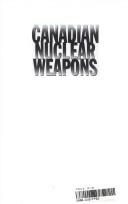
ISBN: 1554881218 9786611969691 1281969699 9781554881215 1550022997 9781550022995 Year: 1998 Publisher: Toronto [Ont.] Dundurn Press
Abstract | Keywords | Export | Availability | Bookmark
 Loading...
Loading...Choose an application
- Reference Manager
- EndNote
- RefWorks (Direct export to RefWorks)
Nuclear weapons --- Atomic weapons --- Fusion weapons --- Thermonuclear weapons --- Weapons of mass destruction --- No first use (Nuclear strategy) --- Nuclear arms control --- Nuclear disarmament --- Nuclear warfare --- History.
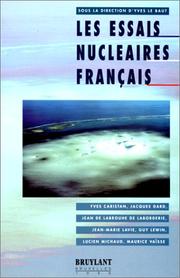
ISBN: 2802707132 9782802707134 Year: 1996 Publisher: Bruxelles : Bruylant,
Abstract | Keywords | Export | Availability | Bookmark
 Loading...
Loading...Choose an application
- Reference Manager
- EndNote
- RefWorks (Direct export to RefWorks)
Armes nucléaires --- Essais. --- Nuclear weapons --- Testing --- France --- FRANCE --- Nuclear tests --- Nuclear weapons. --- Atomic weapons --- Fusion weapons --- Thermonuclear weapons --- Weapons of mass destruction --- No first use (Nuclear strategy) --- Nuclear arms control --- Nuclear disarmament --- Nuclear warfare --- Monograph --- Armes nucléaires - France - Essais.
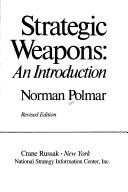
ISBN: 0844814113 0844813990 9780844813998 9780844814117 Year: 1982 Volume: 38 Publisher: New York (N.Y.): Crane and Russak
Abstract | Keywords | Export | Availability | Bookmark
 Loading...
Loading...Choose an application
- Reference Manager
- EndNote
- RefWorks (Direct export to RefWorks)
Nuclear weapons --- Strategic forces --- #SBIB:327.5H22 --- Armed Forces --- Deterrence (Strategy) --- Strategy --- Atomic weapons --- Fusion weapons --- Thermonuclear weapons --- Weapons of mass destruction --- No first use (Nuclear strategy) --- Nuclear arms control --- Nuclear disarmament --- Nuclear warfare --- Ontwapeningsproblemen - bewapening
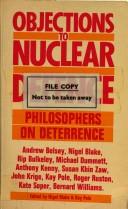
ISBN: 0710202490 Year: 1984 Publisher: London Routledge and Kegan Paul
Abstract | Keywords | Export | Availability | Bookmark
 Loading...
Loading...Choose an application
- Reference Manager
- EndNote
- RefWorks (Direct export to RefWorks)
Deterrence (Strategy) --- -Nuclear weapons --- -Atomic weapons --- Fusion weapons --- Thermonuclear weapons --- Weapons of mass destruction --- No first use (Nuclear strategy) --- Nuclear arms control --- Nuclear disarmament --- Nuclear warfare --- Moral and ethical aspects --- Nuclear weapons --- Moral and ethical aspects. --- -Moral and ethical aspects
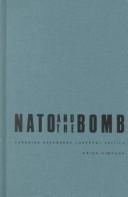
ISBN: 0773568654 9780773568655 0773521186 9780773521186 0773520880 9780773520882 Year: 2001 Publisher: Montreal : McGill-Queen's University Press,
Abstract | Keywords | Export | Availability | Bookmark
 Loading...
Loading...Choose an application
- Reference Manager
- EndNote
- RefWorks (Direct export to RefWorks)
Using a new conceptual framework, this study documents and analyses the underlying convictions of influential Canadians, explains why there were such varied degrees of support for NATO, and shows why different leaders either supported or rejected nuclear weapons and the stationing of the Canadian Forces in Europe. Examples taken from previously classified documents illustrate how the underlying convictions of leaders such as Prime Minister John Diefenbaker and Prime Minister Pierre Trudeau significantly shaped defence policy. Behind-the-scenes maneuvering and competing beliefs about nuclear weapons, deterrence strategy, and possible entrapment in a nuclear war led some to defend and others to criticize Canada's approach to both NATO and the bomb. Despite the technological ability and resources to develop its own nuclear weapons - or to acquire them from the United States - Canada ultimately chose not to become a nuclear power. Why did some Canadian leaders defend the nuclear option and urge the deployment of the Canadian Forces in Europe? Why did others condemn the country's nuclear commitments and call for an end to the arms race? Simpson shows that some leaders rejected prevailing American defence strategy and weapons systems to pursue alternative approaches to managing Canada's complex bilateral and multilateral defence relationships.
HISTORY --- Military / Nuclear Warfare --- Nuclear weapons --- Government policy --- Canada --- Military policy. --- Atomic weapons --- Fusion weapons --- Thermonuclear weapons --- Weapons of mass destruction --- No first use (Nuclear strategy) --- Nuclear arms control --- Nuclear disarmament --- Nuclear warfare --- North Atlantic Treaty Organization
Book
ISBN: 1282126164 9786612126161 0191569798 Year: 2009 Publisher: Oxford ; New York : Oxford University Press,
Abstract | Keywords | Export | Availability | Bookmark
 Loading...
Loading...Choose an application
- Reference Manager
- EndNote
- RefWorks (Direct export to RefWorks)
Written by a distinguished policy practitioner in the field of nuclear weapons this book reflects an exceptional depth of experience in shaping both national and NATO policy. It discusses the significance of the revolution brought about by nuclear weapons, and then considers the problems, costs, and risks which they entail. - ;The book reflects the author's experience across more than forty years in assessing and forming policy about nuclear weapons, mostly at senior levels close to the centre both of British governmental decision-making and of NATO's development of plans and deployments, with
Nuclear weapons. --- Nuclear arms control. --- Nuclear weapons control --- Arms control --- Nuclear weapons --- Atomic weapons --- Fusion weapons --- Thermonuclear weapons --- Weapons of mass destruction --- No first use (Nuclear strategy) --- Nuclear arms control --- Nuclear disarmament --- Nuclear warfare
Book
ISBN: 0191771686 9780191771682 9780198702023 0198702027 0191005525 9780191005527 Year: 2015 Publisher: Oxford Oxford University Press
Abstract | Keywords | Export | Availability | Bookmark
 Loading...
Loading...Choose an application
- Reference Manager
- EndNote
- RefWorks (Direct export to RefWorks)
Based on a detailed analysis of archives and high level interviews this book looks at the role of beliefs, culture and identity in the making of British nuclear policy from 1945 through to the present day.
Nuclear weapons --- Government policy --- Great Britain --- History, Military --- Politics and government --- Atomic weapons --- Fusion weapons --- Thermonuclear weapons --- Weapons of mass destruction --- No first use (Nuclear strategy) --- Nuclear arms control --- Nuclear disarmament --- Nuclear warfare --- Since 1900
Book
ISBN: 1950192628 9781950192625 195019261X 9781950192618 Year: 2019 Publisher: Brooklyn, NY punctum books
Abstract | Keywords | Export | Availability | Bookmark
 Loading...
Loading...Choose an application
- Reference Manager
- EndNote
- RefWorks (Direct export to RefWorks)
A Nuclear Refrain is a spatial fiction that critiques the policy of nuclear deterrence, the concept of Mutually Assured Destruction, and the UK's decision to replace its Vanguard submarines, so-called Trident replacement. We challenge that decision via extending our geographical imaginations into the past, present, and future. Noting the more usual economic, moral, and strategic objections to Trident and its replacement, A Nuclear Refrain considers the issues from less familiar perspectives: the emotional and embodied, empire and the establishment, and the impact on democratic potentialities. Set against the authors' ongoing participation in extensive public protests against the UK's decision to replace Trident in 2016, A Nuclear Refrain disrupts familiar academic and policy forms of writing. It is "an uncomfortable hybrid between academia and fiction," intent on discomfiting the reader to spur the radical reimagining of a world profoundly shaped by the threat of nuclear weapons. Inspired by author and social critic Charles Dickens, this book draws on the form of A Christmas Carol. Transported by "ghosts" of the nuclear past, present and future, a pro-Trident British policy maker, the Right Honourable Roger C. Bezeeneos, has his perceptions sorely challenged. But will Roger allow his feelings to influence his decision-making? Will he recognize the yearning for empire-lost that mobilizes the British establishment? And will he admit the limiting of political participation that a commitment to nuclear deterrence determines? It's your call, Roger."
Nuclear weapons --- Sociology (General). --- Fiction. --- Nuclear weapons. --- Atomic weapons --- Fusion weapons --- Thermonuclear weapons --- Weapons of mass destruction --- No first use (Nuclear strategy) --- Nuclear arms control --- Nuclear disarmament --- Nuclear warfare --- nuclear deterrence --- emotion --- empire --- democracy --- spatial fiction --- nuclear weapons --- disarmament
Book
ISBN: 0850662192 Year: 1983 Publisher: London Taylor & Francis Ltd
Abstract | Keywords | Export | Availability | Bookmark
 Loading...
Loading...Choose an application
- Reference Manager
- EndNote
- RefWorks (Direct export to RefWorks)
Nuclear weapons --- Uranium enrichment --- 341.67 --- 623.454.8 --- Enrichment of uranium --- Isotope separation --- Uranium --- Atomic weapons --- Fusion weapons --- Thermonuclear weapons --- Weapons of mass destruction --- No first use (Nuclear strategy) --- Nuclear arms control --- Nuclear disarmament --- Nuclear warfare --- Isotopes --- Polemology --- kernwapens
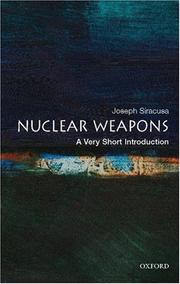
ISBN: 128134124X 9786611341244 0191528013 9780191528019 9781281341242 9780199229543 0199229546 Year: 2008 Publisher: Oxford New York
Abstract | Keywords | Export | Availability | Bookmark
 Loading...
Loading...Choose an application
- Reference Manager
- EndNote
- RefWorks (Direct export to RefWorks)
In a fluid and uncertain world, wracked by fears of terrorism, the Bomb matters. Indeed it may matter more today than at any time before or during the Cold War. This book reveals why - providing a lucid and chilling account of nuclear weapons, their history, their role in global politics, and how we have - so far - managed to avoid armageddon. - ;Despite not having been used in anger since Hiroshima and Nagasaki, the Bomb is still the biggest threat that faces us in the 21st century. As Bill Clinton's first secretary of defence, Les Aspin, aptly put it: 'The Cold War is over, the Soviet Union
Nuclear weapons. --- Nuclear weapons --- Nuclear arms control. --- Nuclear weapons control --- Arms control --- Atomic weapons --- Fusion weapons --- Thermonuclear weapons --- Weapons of mass destruction --- No first use (Nuclear strategy) --- Nuclear arms control --- Nuclear disarmament --- Nuclear warfare --- History.
| Listing 1 - 10 of 218 | << page >> |
Sort by
|

 Search
Search Feedback
Feedback About UniCat
About UniCat  Help
Help News
News